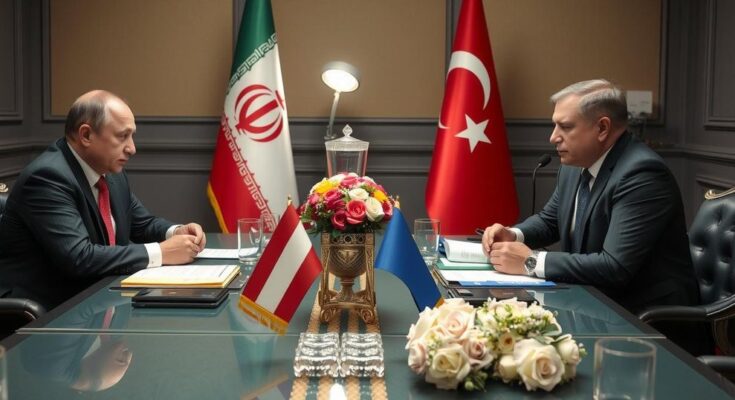Turkey, Russia, and Iran will meet this weekend in Qatar to discuss the implications of a recent HTS rebel offensive in Syria, which has altered the conflict dynamics. The meeting, part of the Astana process, aims to foster political dialogue amid heightened military tensions and strategic shifts among the involved nations, particularly regarding territorial integrity and rebel advancements.
This weekend, Turkey, Russia, and Iran are set to convene in Qatar to address the implications of a recent offensive by Syrian rebels that has significantly shifted the dynamics within Syria’s prolonged civil war. The discussions will occur alongside the Doha Forum, which gathers international diplomats and scholars to deliberate on pressing global issues. Turkey’s Foreign Minister Hakan Fidan will lead the talks under the Astana process, which aims to facilitate a political resolution to the ongoing conflict.
The Astana process, initiated in 2017, represents collaboration between Russia, Iran, and Turkey, each holding divergent affiliations within the Syrian conflict; while Russia and Iran back President Bashar al-Assad, Turkey offers support to various rebel factions. Following a ceasefire established in 2020 that successfully halted widespread hostilities, the recent swift advances by the Islamist group Hayat Tahrir al-Sham (HTS) have propelled the rebels to regain strategic territories, including Aleppo and Hama.
In recent dialogues, President Vladimir Putin has emphasized the necessity to thwart any aggressive moves against Syria’s sovereignty. President Recep Tayyip Erdogan has affirmed Turkey’s commitment to Syrian territorial integrity, advocating for a political dialogue from the Assad regime towards resolving the conflict.
As the HTS offensive unfolds, clashes have ensued between competing militias, further fracturing the tenuous balance established by previous ceasefires. Notably, both Russia and Iran face constraints that may affect their strategic support for Assad, with Russia entangled in its own military ventures in Ukraine and Iran grappling with the ramifications of Israeli military actions against its affiliates.
Former U.S. officials have expressed mixed views over the potential strategic shifts caused by HTS gains in territory, with some suggesting it may compel Assad’s allies to negotiate more earnestly. However, skepticism remains regarding their willingness to abandon Assad, given their strategic interests in Syria.
Turkey’s concern about the emergence of a Kurdish entity in northeastern Syria—viewed as a threat due to ties with the PKK—remains prevalent. Amidst the escalating conflicts and tensions, the urgent need for a ceasefire is underscored by the potential for further refugee flows back into Turkey or even into Lebanon if the situation escalates.
The Syrian civil war, which commenced in 2011, has drawn in various domestic and international actors with conflicting interests. Turkey, Russia, and Iran have emerged as key players, each advocating for particular factions and pursuing their strategic objectives. The Astana process was initiated to foster dialogue and a potential resolution to the conflict, facilitating ceasefires and negotiations. Recent escalations, particularly by the Islamist faction HTS, have prompted concerned responses from these nations, reshaping the ongoing discussions and coalition dynamics in Syria. Turkey, especially, has taken a firm stance on preventing any Kurdish political autonomy in the region, which it associates with terrorist activities against its own state. The developments in Aleppo and Hama highlight the fragile nature of control and governance in Syria, leading to multifaceted military engagements, including renewed U.S. support for Syrian Democratic Forces against ISIS. The geopolitical ramifications of these conflicts thus carry weight not just for Syria but for regional security and international interests as well.
The upcoming trilateral meeting in Qatar reflects the urgent need for concerted dialogue amidst the ongoing upheaval in Syria, particularly following HTS’s recent territorial gains. As Turkey, Russia, and Iran assess their strategies and alliances, the outcomes of these discussions may influence the future trajectory of the Syrian conflict and regional stability. Each participant’s vested interests will shape their negotiations and potential resolutions, all while broader international dynamics and challenges complicate the landscape. Highlights include escalating clashes, refugee considerations, and the critical need for a sustainable ceasefire to prevent further humanitarian crises.
Original Source: www.voanews.com




